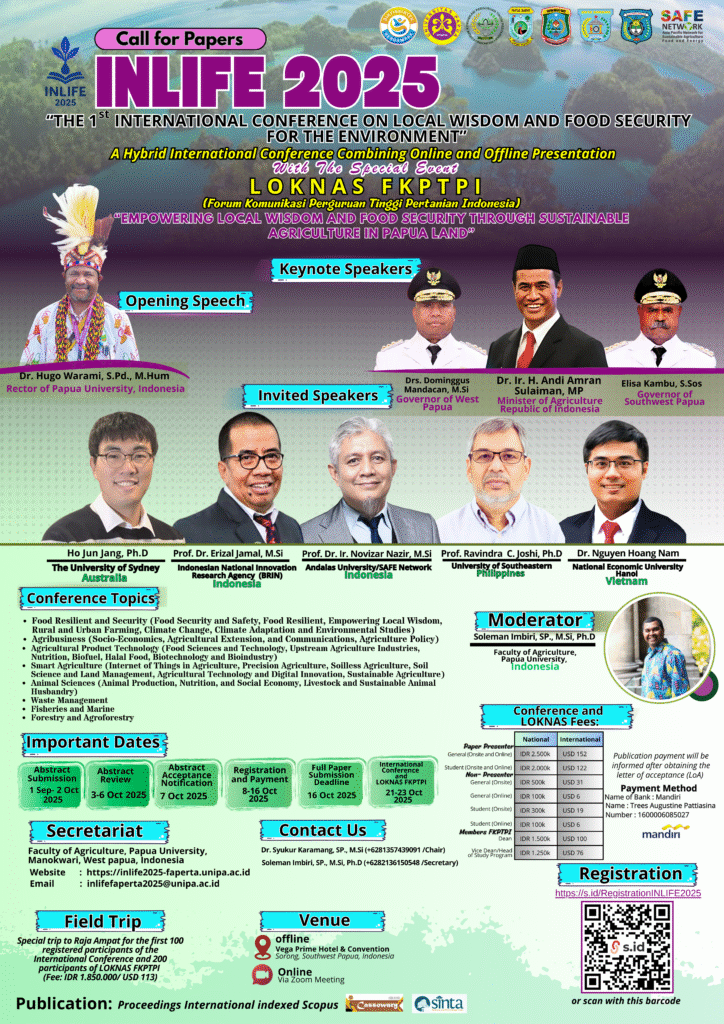
JOIN THE Ist INTERNATIONAL CONFERENCE ON LOCAL WISDOM AND FOOD SECURITY FOR THE ENVIRONMENT (INLIFE 2025) AND NATIONAL WORKSHOP OF COMMUNICATION FORUM FOR AGRICULTURE HIGHER EDUCATION INSTITUTIONS IN INDONESIA
Recognizing and strengthening indigenous knowledge, cultural practices, and traditional methods of farming to promote food security and sustainable development are crucial especially in Papua Land. This is because this approach involves leveraging the unique ecological understanding and agricultural techniques developed by local communities over generations, which are often well-adapted to the local environment. By empowering these local practices, communities can improve their agricultural productivity, preserve their cultural heritage, and ensure long-term food availability. Sustainable agriculture in this context aims to balance environmental health, economic viability, and social equity, ensuring that farming methods do not deplete natural resources or harm ecosystems. Therefore, the concept advocates for a participatory, culturally respectful approach that integrates local wisdom into sustainable development strategies to enhance food security in Papua Land.
The linkage between the Sustainable Development Goals (SDGs) and the focus on empowering local wisdom and food security through sustainable agriculture in Papua Land revolves around aligning global objectives with local practices and knowledge systems. The SDGs aim to address broad global challenges such as poverty, hunger, and environmental sustainability. However, implementing these goals in Papua Land may encounter challenges related to respecting and integrating indigenous knowledge, cultural practices, and local agricultural methods. Empowering local wisdom involves recognizing and utilizing indigenous and traditional practices that have sustained communities for generations, which may sometimes differ from standardized or externally imposed sustainable agriculture techniques aligned with SDGs. The core issue, therefore, is ensuring that the pursuit of SDGs does not overlook or undermine local customs and knowledge systems. Instead, it should support and enhance local agricultural practices to improve food security while respecting cultural integrity. Achieving this balance requires careful, context-specific strategies that harmonize global sustainability targets with local realities and wisdom.
Conference Theme:
“Empowering Local Wisdom and Food Security Through Sustainable Agriculture in Papua Land“
SUB-THEMES
- Food Resilient and Security (Food Security and Safety, Food Resilient, Rural and Urban Farming, Climate Change, Climate Adaptation and Environmental Studies)
- Agribusiness (Socio-Economics, Agricultural Extension and Communications, Agriculture Policy)
- Smart Agriculture (Internet of Things in Agriculture, Precision Agriculture, Soilless Agriculture, Soil Science and Land Management, Agricultural Technology and Digital Innovation, Sustainable Agriculture)
- Animal Sciences (Animal Production, Nutrition, Social Economy, Livestock and Sustainable Animal Husbandry)
- Waste Management
- Fisheries and Marine
- Forestry and Agroforestry
Special Events: FKPTPI National workshop
FKPTPI or Forum Komunikasi Perguruan Tinggi Pertanian Indonesia is a forum for communication among agricultural universities throughout Indonesia, based on Pancasila and the 1945 Constitution. The purpose of FKPTPI is to unite Indonesian Agricultural Universities to improve Agricultural Higher Education and Agricultural Development in Indonesia. Through this forum, it is hoped that a solid network will be created, knowledge, experience, and innovation will be shared in order to improve the quality of agricultural higher education and support sustainable national agricultural development. Thus, FKPTPI plays a vital role in strengthening the position of Indonesian agricultural universities as centers for the development of science and technology relevant to national development needs.
Realizing the importance of the role of FKPTPI in responding to local, national and global challenges, Faculty of Agriculture University of Papua was chosen by FKPTPI Working Group members to hold the 1st International Conference on Local Wisdom and Food Security for the Environment with the special event is LOKNAS (Lokakarya Nasional or National Workshop)of FKPTPI which is an annual event.
To request an invitation letter, please click the following link ttps://s.id/permohonanundangan
